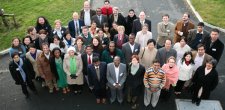San José, Costa Rica. 2009
Last April 29th and 30th, representatives from TAI Coalitions from Guatemala, Honduras, El Salvador, and Costa Rica gathered in regional workshop to create a common Action Plan to strengthen their work on the implementation of Principle 10.
The Action Plan has three sections:
A) Challenges and commitments of the leader organizations in each coalition: This point is related with the strengthening of the following aspects: 1) National coalitions to promote the Access Rights. 2) Information channels within the coalitions and between the coalitions. 3) Fundraising for national coalitions projects. 4) the inclusion of the Dominican Republic and Panama in the regional process. 5) Establishing a regional partnership that consolidates common work strategies and get funding for regional projects. 6) Political context challenges in each country. B) Regional Agenda: This point refers to issues related with: 1) access to information and communications between governments and civil society, 2) Legal framework on access rights. 3) Proceedings and institutional structures of public participation. 4) Education and training on access rights. 5) Funding for public participation and access to information. C) Building a regional partnership: It contains the actions defined to create a regional partnership of TAI Coalitions in Central America.
As part of the program, the meeting had two spaces to tend other topics: Daniel Barragán, from TAI Ecuador, presented the hemispheric strategic plan of Latin America Access Coalitions. Aldo Palacios and Diego Cooper from PP10 Secretariat presented the components and the work of the Partnership for Principle 10.
This workshop is an activity of the project “Partnership 10 Central America” which is funded by the International Union for Conservation of Nature (IUCN) and executed by Foundation for Peace and Democracy(FUNPADEM).
Further information please contact Luis Diego Segura from Foundation for Peace and Democracy, FUNPADEM. Email sociedadcivil@funpadem.org or +506 2283 9435.
